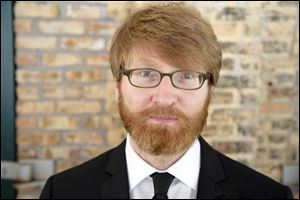
In latest venture, author Chuck Klosterman tries to answer, what does it mean to be a villain?
9/7/2013
Klosterman
Chuck Klosterman, the author of such influential works of pop anthropology as Sex, Drugs, and Cocoa Puffs and Fargo Rock City, is the best kind of philosopher — the kind who refuses to cop to being a deep thinker even as he’s kicking in the doors of perception (and sometimes spraining his ankle in the process).
In I Wear the Black Hat: Grappling With Villains (Real and Imagined), his first collection of original essays since 2010’s Eating the Dinosaur, Klosterman asks what it means to be a villain and how to differentiate true villains from those who are simply morally confused.
Early in the book, Klosterman settles on a pithy definition of a villain that works as well as any proffered by any religion in the last 10,000 years: “The villain is the person who knows the most, but cares the least.”
With the aplomb of a modern Machiavelli surveying our ever-shifting moral landscape for examples that prove his point, Klosterman takes the reader on a grand tour of villainy’s outposts in popular culture, sports, politics, and American history.
In a vertiginous but often humorous journey through our collective experience, Klosterman makes a case for why universally acknowledged villains (New York subway vigilante Bernhard Goetz, comedian Andrew Dice Clay, treasonous BFF Linda Tripp, occultist Aleister Crowley, and WikiLeaks founder Julian Assange) earned their places in the pantheon of unambiguous villainy.
He also makes a case for unacknowledged but operational villains as disparate as Muhammad Ali, Bill Clinton, and hijacker D.B. Cooper that adds a layer of contrarian nuance to his definition.
Some people and institutions self-consciously embrace the dark side because it is an inextricable part of who they are. Klosterman counts gangsta rap pioneers N.W.A and the Oakland Raiders among this cohort of cheesy, self-mythologizing villains.
In what is destined to be one of the book’s most quoted chapters, Klosterman explains why as a former rock critic and lifelong music fan, he was once “contractually obligated” to hate Bruce Springsteen, Van Halen, Dire Straits, R.E.M., Pink Floyd, Phish, U2, Coldplay, and Blur.
At one point, Klosterman refers to pop singer Taylor Swift as a “one woman ‘Hotel California’ ” to underscore his dislike of both the pop star and the Eagles.
On a sober note, a good chunk of the first chapter deals with the quandary presented by Joe Paterno, the late Penn State University football coach whose reputation unraveled in his final months as Jerry Sandusky, his former defensive coordinator, stood accused of multiple counts of rape and child abuse that ultimately resulted in his conviction and life sentence.
Keeping in mind Klosterman’s definition of a villain as “someone who knows the most but cares the least,” the author asks why PSU’s iconic football coach failed to care enough to use his institutional clout and moral authority to stop Sandusky when he knew enough early on to suspect the worst.
I Wear the Black Hat is an erudite, provocative, and playful survey of the ever-shifting face of villainy in the American experience. To think of villainy as just Hitler is to miss its multifaceted reality.
The Block News Alliance consists of The Blade and the Pittsburgh Post-Gazette. Tony Norman is a writer for the Post-Gazette.
Contact him at: tnorman@post-gazette.com